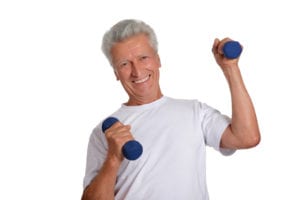Written by Joyce Smith, BS. Exercise significantly altered the composition of gut microbiota in lean participants, and in particular, increased the butyrate-producing microbiota, the levels of which were not sustainable once exercising ceased.
 Two very recent studies, one in mice 1 and the other in human participants 2 were done to validate that exercise alone can change the composition of gut microbiota. The first study 1 involved the transplantation of fecal material from exercised and sedentary donor mice into the colons of sedentary germ-free recipient mice. Recipients of the microbiota from the exercised donor mice had a significantly higher proportion of microbes that produce butyrate, a short-chain fatty acid that promotes healthy intestinal cells, reduces inflammation and generates energy for the host. They also appeared to be more resistant to experimental ulcerative colitis.
Two very recent studies, one in mice 1 and the other in human participants 2 were done to validate that exercise alone can change the composition of gut microbiota. The first study 1 involved the transplantation of fecal material from exercised and sedentary donor mice into the colons of sedentary germ-free recipient mice. Recipients of the microbiota from the exercised donor mice had a significantly higher proportion of microbes that produce butyrate, a short-chain fatty acid that promotes healthy intestinal cells, reduces inflammation and generates energy for the host. They also appeared to be more resistant to experimental ulcerative colitis.
In the second study 2, a 14-week longitudinal human study, the same research team sought to determine whether exercise in humans could affect our gut microbiota and their metabolites. Thirty two (18 lean and 14 obese) previously sedentary subjects participated in 6 weeks of supervised, endurance –based progressively strenuous exercise training (30 – 60 minutes, 3 days/week) that was followed by a six-week washout period of sedentary activity. Fecal and blood samples were collected prior to and after the 6 weeks of exercise, as well as after the 6- week sedentary washout period. Three-day dietary controls were in place prior to each collection.
The research team observed that fecal concentrations of short-chain fatty acids (SCFAs), in particular butyrate, increased in the human gut as a result of exercise. These levels declined after participants reverted to sedentary life style. Genetic tests of the microbiota confirmed that exercise increased the proportion of microbes that produce butyrate and other SCFAs. The most dramatic increases were seen in lean participants who had significantly lower levels of SCFAs- producing microbes in the guts to begin with. Obese participants saw only modest increases in the proportion of SCFA- producing microbes. The ratios of different microbes in the gut also differed between lean and obese participants at every stage of the study.
Analysis specifically demonstrated the following:
- Exercise training significantly increased lean body mass, decreased body fat percentage and increased bone mineral density (p<0.05) in both lean and obese participants.
- Cardiorespiratory fitness (VO2max) significantly increased in both lean and obese participants as well (p<0.05). These changes reversed towards baseline values when both lean and obese participants reverted to a sedentary lifestyle (p<0.05).
- Exercise significantly increased concentration of fecal SCFA producing microbes in lean but not obese participants (p<0.05) and significantly increased the abundance of the butyrate –regulating gene BCoAT and proprionate –regulating gene mmDA (p<0.05). However, during the 6 week sedentary period, the abundance of these genes diminished as well as the SCFA-producing capacity of the gut micobiome (p<0.05). For example, the following five butyrate-regulating bacterial genera, Roseburia spp., Lachnospira spp., Clostridiales spp., Faecalibacterium spp., and f Lachnospiraceae unclass positively correlated with changes in butyrate and/or BCoAT, while changes in Bacteroides spp. and Rikenella spp. were negatively correlated (p < 0.05).
These results demonstrate that there are clear differences in how the microbiome of an obese individual versus a lean individual responds to exercise. They definitively show that “exercise training induces changes in the composition and function of the human gut microbiota and are dependent on obesity status, independent of diet and contingent on the sustainment of exercise”.
Source: Allen, Jacob M., Lucy J. Mailing, Grace M. Niemiro, Rachel Moore, Mark D. Cook, Bryan A. White, Hannah D. Holscher, and Jeffrey A. Woods. “Exercise Alters Gut Microbiota Composition and Function in Lean and Obese Humans.” Urbana 51 (2017): 61801.
© 2017 American College of Sports Medicine
Posted January 8, 2018.
Joyce Smith, BS, is a degreed laboratory technologist. She received her bachelor of arts with a major in Chemistry and a minor in Biology from the University of Saskatchewan and her internship through the University of Saskatchewan College of Medicine and the Royal University Hospital in Saskatoon, Saskatchewan. She currently resides in Bloomingdale, IL.
References:
- Allen J, Mailing L, Cohrs J, et al. Exercise training-induced modification of the gut microbiota persists after microbiota colonization and attenuates the response to chemically-induced colitis in gnotobiotic mice. Gut microbes. 2017:1-16.
- Allen JM, Mailing LJ, Niemiro GM, et al. Exercise Alters Gut Microbiota Composition and Function in Lean and Obese Humans. Urbana. 2017;51:61801.
